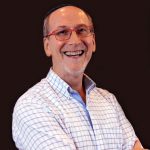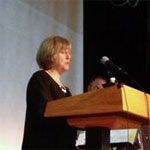Community Blog Chaplaincy: Voices from the Field

The still small voice of the health care system has finally received some attention during the COVID-19 pandemic as both hearts and spirits are requiring urgent care. Chaplains, spiritual care specialists, are being seen and appreciated in the wave of gratitude for all those serving on the front lines of the COVID pandemic. Chaplains regularly support patients and families in life changing, life-limiting or life-ending situations. Chaplains listen, chaplains bless, chaplains are skillfully and sturdily present when most people can only look away. Chaplains are “spiritual chameleons,” reflecting and responding to patients’ own religious or spiritual language. Most of all, chaplains offer chesed, lovingkindness.
When people ask me what I do, I rely on the poet Mary Oliver for the simplest explanation of how I see my chaplaincy: “My work is loving the world,” she begins her poem, “Messenger” (Thirst, 2006). Like Oliver, I offer love to patients as the best remedy for their spiritual distress. My hope is that as I approach each patient, they sense that they are cared for in their vulnerability, their fears, their hopes and their prayers. I listen deeply. I stay. I am not judgmental. I am calm.
I reached out to a few of my dear Hebrew College colleagues to hear their stories and the role of chesed in their chaplaincies.

“I received a request to provide support for a patient who will die of COVID-19 today. I walked over to the Intensive Care Unit to find out more about the patient and the patient’s family, to see how I could best support them. I walked over intending to be a support to the staff in the ICU, who are beginning to watch their patients die on a daily basis. My job is to be present and witness people, but all I could think about were the invisible droplets potentially scattering throughout the air… everywhere. I was wearing a regular surgical mask and felt my attention snap as a patient’s door opened or a nurse removed her N95 while speaking to me. I was off balance. This is brand new territory.
Then, the nurse before me began to speak. I was there, in front of her, after all, and she knew me and that my job was to care for her as well as for the patients. So I stood there, and I did what I have been trained to do. What is my calling. I listened. Deeply, and intently. My fears of invisible droplets began to dissipate as my focus homed in on the nurse before me. A Jewish woman in her 60s with hair as blonde as a cheerleader’s and a demeanor to match, she began to talk to me about how she is getting through this pandemic. She told me that she tries not to focus on the fear, because that doesn’t help anything, but rather on the love. “It’s all about LOVE,” she said, and she was right. Her team makes fun of her because when things get tough, she has always told them to “send love to the situation.” Now she repeats the message to her team over and over and over. I told the nurse how much I admired how she was handling this situation with such grace and leading her team with love. How much I respected and appreciated not only what she was doing, but how she was doing it.
This is why I am a hospital chaplain. Every day I learn from near strangers who remind me of my core values. It is all about the love. All of us here in the hospital are motivated by a deep need to offer chesed. We have to be. My job is as simple (which is not the same as easy!) as showing up with a willingness to listen. It is my honor to witness such love, and I am grateful to be able to do it each day.”

“On a visit to a resident she told me sheepishly that she didn’t know why she had said ‘Yes’ to a visit. But after sharing about her family, she confided she was afraid of outliving her children. And she was then moved to tears as I offered a prayer for her and her family.”
“At a first visit with another resident in our community, she opened with a smile and then, these words: ‘When I saw you, I decided you’re the rabbi I’d like to do my funeral. So I wanted you to get to know me.’ This was a bittersweet moment of both introduction, and anticipation of farewell,” he added.
“I can’t take away the fear we all have of the unknown, though I sometimes fall back to the instinctive wish that I could. And so, I settle myself to be present and I embrace the journey I’ve been invited to share with all its ups and downs.”
Rabbi Israel de la Piedra: Director of Spiritual Care, Miami Jewish Health, Miami, FL
When I reached out to Rabbi Israel de la Piedra, he had just lost two residents to COVID -19 and Pesach was approaching. And while he the demands of his chaplaincy in this moment meant he couldn’t share a specific story, I knew he was living chesed through his work with those two residents and, despite his grief, finding the strength to help others (and himself) prepare for Pesach.

Rabbi Judi Ehrlich told me she is working long hours because of the demands of the pandemic and holiday season. In response to the social distancing requirements, Rabbi Judi has replaced her in-person visits with phone calls to as many residents a day as possible for spiritual check ins. She pre-recorded a seder for Pesach, a Pesach Yizkor service and ongoing Jewish learning classes, and Shabbat services, broadcast on closed circuit TV channel so that all NewBridge residents can benefit from engaging in moments of Jewish sacred time and tradition while restricted to their apartments. Despite her challenging schedule, she said, “I love and truly care about every single person I serve. I love being a chaplain and am grateful to be able to do this meaningful work.”
Hebrew College Alumni Chaplains and Rabbis Working in Health Care Settings
- Rabbi Joel Baron`14, Rabbi, Hebrew SeniorLife Hospice Care, MA
- Rabbi Michael Cohen `08, Director of Rabbinical Services and Pastoral Care, The Legacy Senior Communities, TX
- Rabbi Judi Ehrlich `08, Rabbi/Chaplain, NewBridge on the Charles, Hebrew SeniorLife, MA
- Rabbi Janie Hodgetts, ’08, Chaplain, St. Elizabeth Medical Center and Dana Farber Cancer Institute at St. Elizabeth Medical Center, MA
- Rabbi Richard Kline `15, Spiritual Care Practitioner, Foothills Medical Center, Alberta, Canada
- Rabbi Adam Lavitt `12, Rabbi/Chaplain, Hebrew SeniorLife, MA
- Rabbi Margot Meitner `14, Community Rabbi/Psychotherapist/Faculty-Hebrew College, Self-Employed/The Meeting Point/Hebrew College, MA
- Rabbi James Morgan `08 (pictured), Rabbi/Chaplain, Hebrew SeniorLife
- Rabbi Suzanne Offit `09, Rabbi & Palliative Care Chaplain, Hebrew SeniorLife, MA
- Rabbi Israel de la Piedra `13, Rabbi and Director of Spiritual Care, Miami Jewish Health, FL
- Rabbi Richard Rudnick `11, Rabbi & Chaplain, Jewish HealthCare Center, Inc., MA
- Rabbi Ma’ayan Sands `16, Rabbi, Providence house assisted living facility, RI and Temple B’Nai Shalom of Braintree, MA
- Rabbi Dena Trugman `19, Rabbi/Chaplain, Albert Einstein Medical Center, PA
Rabbi Sonia Saltzman `08 also contributed to this article.

